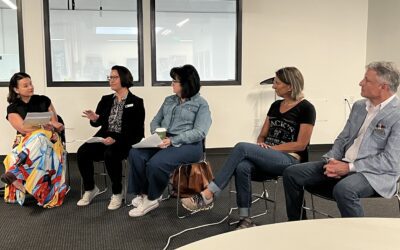By Marsha Barancik, Senior Vice President of Strategic Impact
On March 17, 2023, the Arvada Chamber of Commerce hosted the State of the Economy as an update of market indicators projecting the 2023 local and national economies. Development Research Partners’ President and Chief Economist Patty Silverstein discussed the impact of inflation, and detailed our regional economy’s growth track against labor statistics, real estate trends, industry sector changes, purchasing patterns and population shifts.
Four takeaways from this Community Impact Forum:
1. Labor: Colorado employers continue to be challenged by the supply of available talent, as a historic number of job openings outpace the number of unemployed.
Colorado’s labor force participation is the second highest in the nation and our 2.8% unemployment rate is the tenth lowest in the nation. “2022 was a phenomenal employment growth year,” Silverstein explained. “We had a lot of jobs to add back.” The number of job openings is at a historic high, greater than the number of unemployed.
A concurrent underemployment trend is affecting the ability of employers to hire locally; at approximately 4%, unemployment is higher now than it was pre-pandemic. A significant number of workers who left the workforce during the pandemic have not re-entered or are difficult to track because of the state’s thriving gig economy, which Silverstein said employs approximately 1 million Coloradans. Gig workers typically earn income through a digital platform, run by a company anywhere in the world. Self-employment also affects the state’s talent pipeline, as proprietors are 27% of Colorado’s workforce.
“We have two jobs for every unemployed person in Colorado,” Silverstein explained. At large, metro-Denver’s annual job growth rate is tracking below a 10-year trend of 2.5% per year. The region is 88,000 jobs short, according to the same 10-year trend (2010-2019), our country’s longest expansion streak.
2. Population shift: 2021 saw a significant net migration out of metro-Denver, to other parts of Colorado or out of state – the first net migration loss since 2005.
Moving in with families during the pandemic was a common trend, she said. In 2021, more than 3,000 people left Jefferson County. Colorado’s population drop in part also reflects a drop in international migrants, Silverstein further explained.
3. Timing is everything: A more moderate pace of growth is what the economy needs, Silverstein said, as the 10-year trend for GDP growth is 2.4%.
GDP growth forecast for 2023 is 1.4%. At large, pace-setting is healthy and our economy’s current overall state of growth, behind the 10-year trend, is not alarming, she added. “Economic development deals do not happen overnight. It takes years for a company to get their plans in place.”
4. Housing: Metro-Denver’s median housing price is $62,000 more than the 10-year trend.
Silverstein pointed out that rising home sales will likely plateau or even drop, a needed correction that aligns with state demand for more affordable housing. “The 2% increase in home prices in 2023 is below trend and our perfect pace,” she added.
The Arvada Chamber’s Community Impact Forum series introduces the community to the trends and leaders underlying the B.O.L.D 2026 five-year regional economic strength and resiliency initiatives. The Arvada Chamber’s work through B.O.L.D. 2026 requires a team of business, non-profit and community leaders to play an active role in solving the challenges that are stifling economic strength and opportunity for businesses and families. If you are passionate about solving business challenges in areas like talent and housing, please sign up to be an Arvada Chamber Business Champion here.
The Chamber’s next Community Impact Forum, the Annual State of the City address featuring Arvada Mayor Marc Williams, will take place on Friday, April 21. In his last State of the City Address, Mayor Williams will provide updates on a variety of issues facing the City of Arvada, as well as successes from 2022 and exciting upcoming plans. Register and find sponsorship information here.
Resources:
Upcoming Community Impact Forums:
- April 21: Annual State of the City Address
- May 19: Legislative Recap
- June 16: State of Education
- July 21: State of Transportation
- August 18: State of Housing
- September 15: City Council Election Forum
- October 20: Ballots and Breakfast
- November 17: Annual Mayors Roundtable



0 Comments